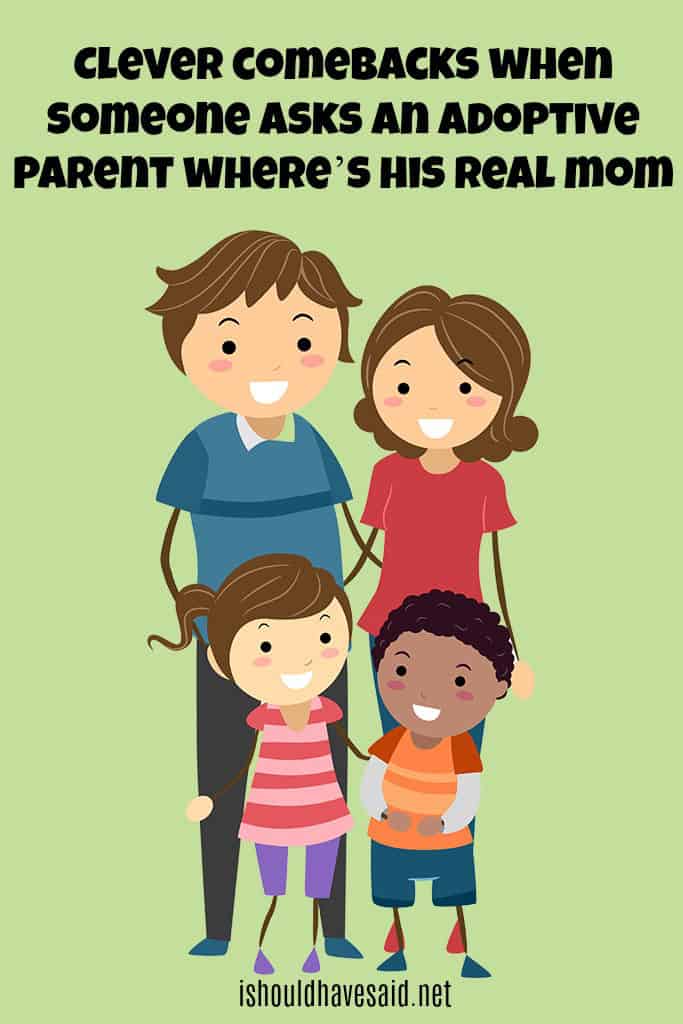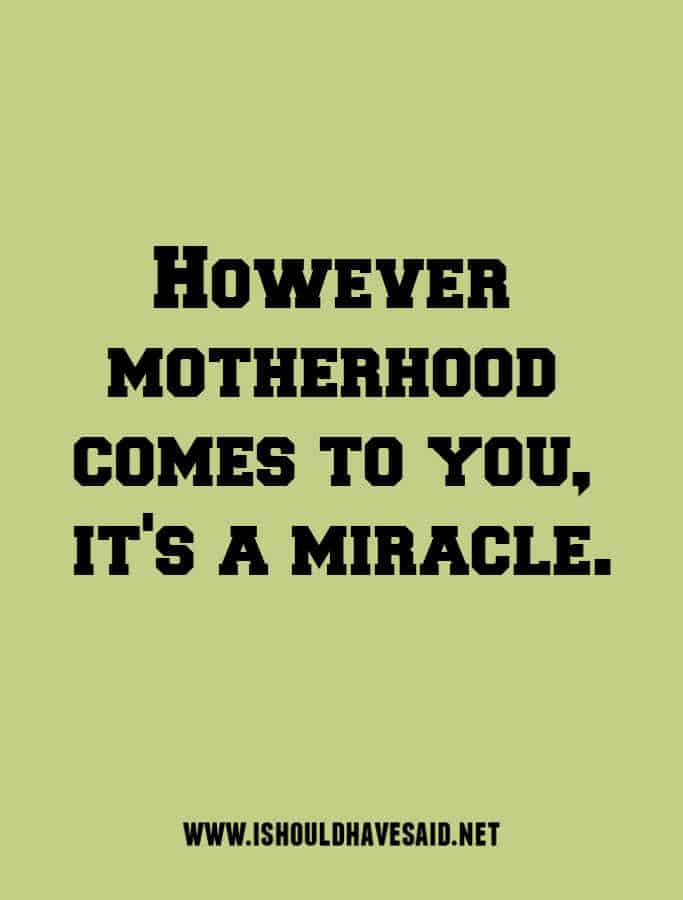
When someone asks the parent of an adopted child, “Where is her real mom?” it can be really hurtful.
Adoptive mothers get asked about the real mom as if they themselves are some fake imposter. A real mom is the one who is there for their child day to day, when they are sick, tackling their homework or sharing a family meal. Real moms are there for the first day of school, the first boyfriend/girlfriend and the ups and downs of life.
Urban dictionary has a fun definition of what a mom is, “The woman who loves you unconditionally, the one who puts her kids before herself and the one who you can always count on above everyone else.
Just telling her your problems makes you feel better because mom’s always know how to make it all go away.”
Next time a nosy stranger asks about your child’s real mom, use one of our clever comebacks and don’t give it a second thought because you are the real mom.
10 Best replies when someone asks where is your adoptive child’s real mom
1. As you can see, I’m about 5’4″, overweight, and extremely tired of questions like this!
2. Children don’t always grow in your stomach, sometimes they grow in the heart and both ways is pure miracle.
3. Biology is the least of what makes someone a mother.
4. A mother is both a noun and a verb. Her birthmother is the noun, I the adoptive mother am the verb. Both are real.
5. The act of pushing out a baby does not make someone a mother. A Mother is the one who has earned that title by being there every day.
6. A real mom is the one who has been there for her child very step of the way, providing love, support and putting on a band aid
7. I consider myself her real mom because I am raising her, and I cherish the opportunity to provide her with a loving and supportive home. It is a gift for both of us.
8. As an adoptive mom, I am honored to be his real mom, guiding him through his life’s journey.
9. I believe that love makes a real mom, and I am proud to be hers.
10. I am her real mom, because I am the one committed to providing her with a happy, loving and stable home.
More adoption posts you might like
- How much did your adopted child cost
- How to answer when people say your adoptive child isn’t your own
- To read more answers to rude parenting questions
Why do people ask adoptive parents where’s her real mom
Adoptive parents may be asked where their child’s birth mother is out of nosiness or curiosity. Many folks don’t realize that these comments can be hurtful to adoptive parents who have dedicated their lives to raising a child.
It is important to show respect for adoptive families who are dealing with their own unique family dynamics.
How to deal with people asking adoptive parents where is her real mom
When people you don’t know ask about your adoptive child’s birth mother try to respond politely and with understanding. It is an opportunity for birth parents to explain that you are your child’s real parent, there every day providing love and support.
You may wish to decide in advance how to respond to nosey questions, especially if your child is within earshot. You have no obligation to reveal any personal family information to anyone who asks.
Join communities with other adoptive parents are navigating a similar family journey, and find out the different ways families handle different injuries about adoption.
Keiko was tired of being asked ‘where’s her real mom?’
Keiko was weary of the persistent question that seemed to follow her wherever she went: “Where’s your real mom?” As an adoptive parent, she often found herself grappling with how to respond to this inquiry, which seemed to disregard the deep bond she shared with her adoptive mother.
Despite the weariness, Keiko remained composed and sought to educate those around her about the significance of her adoptive family. She understood that the question often stemmed from ignorance rather than malice, and she endeavored to respond with patience and understanding.
Over time, Keiko found her voice and began gently but firmly correcting those who posed the question. She explained that her adoptive mother was her “real mom” in every sense of the word, emphasizing the love, care, and support she had received from her since childhood.
Keiko also found solace in connecting with other adoptive families and individuals who had encountered similar inquiries. Together, they shared experiences, offered support, and advocated for greater awareness and sensitivity around adoption-related questions.
As she navigated these encounters, Keiko remained steadfast in her commitment to educating others and promoting a more inclusive understanding of family. She knew that her family’s love and bond transcended biology, and she was determined to convey this message to those around her.
In time, Keiko’s efforts bore fruit, as she noticed a shift in the way people approached the topic of adoption. Through her advocacy and unwavering spirit, she had helped foster a more empathetic and informed dialogue about the diverse and beautiful tapestry of family structures.

The Role of counselling and self care
I Should Have Said Media will earn a commission after clicking links on this page at no additional cost to you. Learn more.
When you are dealing with a person who asks who is your child’s real mom and you find it stressful, consider getting support from a professional. Talking to a counselor is a great way to work through a challenging situation, and help you find some strategies to work through the person’s behaviour.
Better Help is a great resource where you can talk to a counselor from the comfort of your own home.
Taking care of your own needs isn’t selfish, and you will feel better in the long run.







